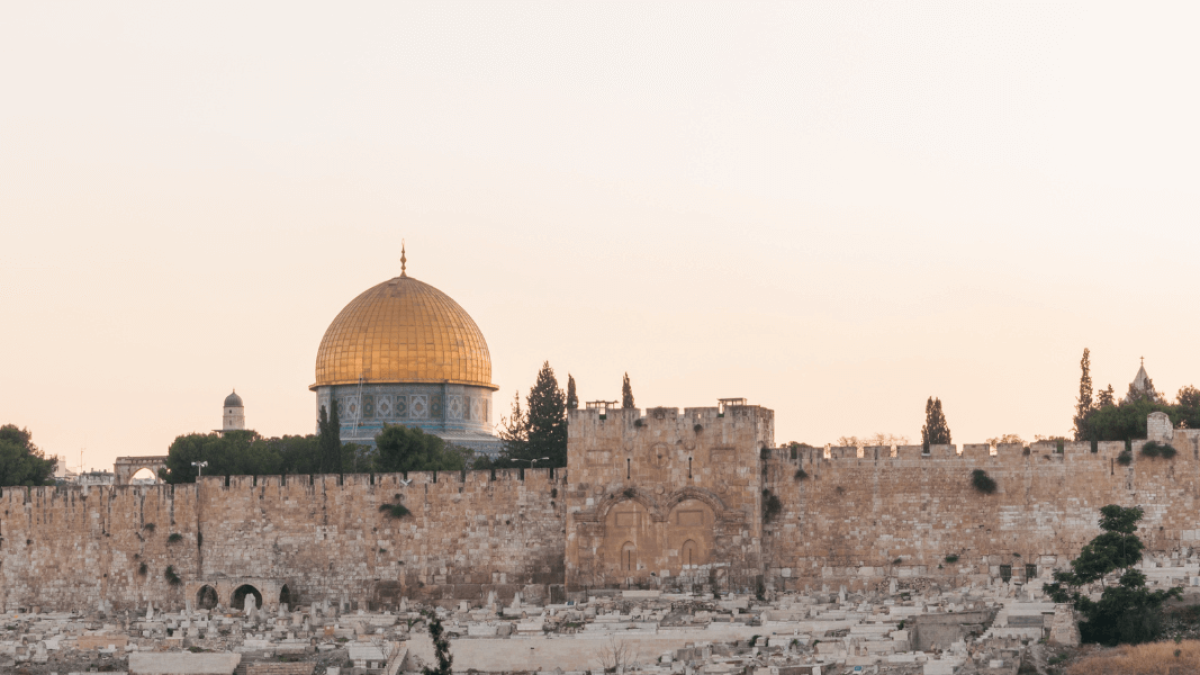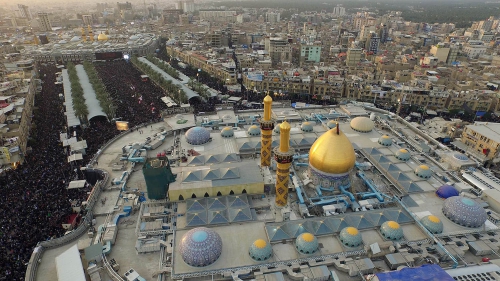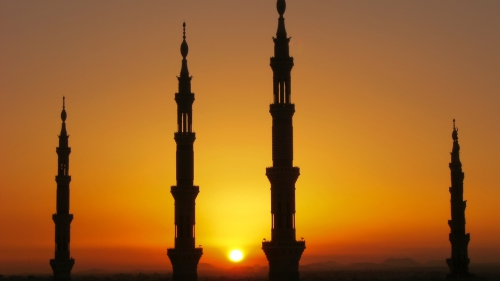Towards the Messianic Age: Exploring Hope, Challenges, and Spiritual Leadership

Last year was the hottest on record by a huge margin and this year will likely be even hotter. The annual global average temperature may, for the first time, exceed 1.5°C above pre-industrial levels—a threshold crucial for stabilizing the Earth's climate. Without immediate action, we are at grave risk of crossing irreversible tipping points in the Earth's climate system. Yet there are some reasons for hope.
Global greenhouse gas emissions may peak this year and start falling. This would be an historic turning point, heralding the end of the fossil fuel era as coal, oil and gas are increasingly displaced by clean energy technologies. But to avoid the worst of the climate crisis, global emissions must roughly halve by 2030.
Human society changed more rapidly, violently and fundamentally in the last century of the second millennium than ever before in history. Doctors saved the lives of millions. Dictators sacrificed the lives of millions. Populations exploded and birthrates declined. Technology produced both worldwide prosperity and pollution at the same time.
Knowing all this, should we look upon the first century of the third millennium with optimistic hope or with fatalistic trepidation? Are the world and our society heading towards a wonder-filled new age, or toward a doomsday; or are both occurring concurrently because breakdown is always a prelude to breakthrough?
Many who believe in the Biblical vision of a Messianic Age use the insights of the Prophets of Israel to provide guidance in understanding the social, economic, scientific and cultural upheavals sweeping society. Usually it is the dramatic dangers of the pre-Messianic tribulation that are emphasized. I will focus on the positive signs developing throughout the world that accord with the Messianic vision of the Biblical Prophets.
In most religious traditions, redemption is defined only in terms of individual enlightenment or personal salvation. However, the Biblical Prophets of Israel conceived redemption as a transformation of human society that would occur through the catalyst of the transformation of the Jewish community. This transformation, which will take place in this world at some future time, is called the Messianic Age.
The transition to the Messianic Age is called the birth pangs of the Messiah. The birth of a redeemed Messianic world may be the result of an easy or difficult labor. If everyone would simply live according to the moral teachings of his or her religious tradition, we would ourselves bring about the Messianic Age.
But, if we will not do it voluntarily, it will come through social and political upheavals, worldwide conflicts and generation gaps. Messiahs refer to agents of God who help bring about this transformation. The Jewish tradition teaches that each agent of God (there may be two or three such agents) will be a human being with great leadership qualities similar to Prophets Moses or Mohammed ﷺ .
The arrival of the Messianic Age is what’s really important, not the personality of the agents who bring it about, since they are simply the instruments of God, who ultimately is the real Redeemer.
The majority of Christians, Jews, and Muslims do not believe that all of humanity is moving closer and closer to a catastrophic Judgement Day. The minority who do think that Judgement Day is coming soon share the usual negative, fear-filled views of most end-times thinkers: Christians, Jews and especially Muslims, who do believe that: “The hour (of Judgement) is near” (Qur’an 54:1); and ˹The time of˺ people’s judgment has drawn near, yet they heedlessly turn away.” (Qur’an 21:1)
According to a 2012 poll by the Pew Research Center, at least half of Muslims in nine Muslim-majority countries believe that the coming of the Mahdi is "imminent," and could happen in their lifetime. Sadly these end-times thinkers always see pre-ordained threats of cataclysmic world wide doom; and not just warning of the consequences if we humans do not repent and change our behavior.
The Messianic Age is usually seen as the solution to all of humanity’s basic problems. This may be true in the long run but the vast changes the transition to the Messianic Age entails will provide challenges to society for many generations to come.
For example, the Prophet Isaiah, 2700 years ago, predicted that someday there would be a radically new world in which Jerusalem would be fulfilled with joy for “no more shall there be in it an infant that lives only a few days.” (65:20) Before the mid 19th century the annual death rate for humans fluctuated from year to year but always remained high, between 30 and over 50 deaths per 1,000 individuals.
Those elevated, unstable rates were primarily caused by infectious and parasitic diseases. The toll from disease among the young was especially high. Almost 1/3 of the children born in any year died before their first birthday; in some subgroups, half died. Because childbirth was hazardous, mortality among pregnant women was also high.
A century ago, the infant mortality rate in Jerusalem (as in most of the world) was 25-30%. Now it is less than 1%. For thousands of years almost every family in the world suffered the loss of at least one or two infants; now it happens to less than one out of a hundred babies.
If this radical improvement had occurred over a few years, it would have greatly impressed people. But since it occurred gradually over several generations, people take it for granted. Also, it seems to be part of human nature that most people focus on complaining about the less than 1% that still die (an individual family tragedy heightened by the fact that it is unexpected because it is so rare) rather than be grateful that the infant mortality rate has been reduced by over 95%.
These improvements in human health are unprecedented in human history. Truly we will be coming close to Isaiah’s prophecy, “One who dies at 100 years shall be reckoned a youth, and one who fails to reach 100 shall be reckoned accursed.” (65:20) such radical change will necessitate major changes in the way we think and act when faced with decisions about life and death.
Yet who among us would want to return to the high mortality rates and early deaths of previous centuries? The challenges we now face are not those of survival, but of opportunity.
The fulfillment of Isaiah’s prophecy has thus gone un-noticed and uncelebrated. But even when the events are rapid and dramatic, people rarely connect them to their Messianic significance for very long.
The amazing rescue of 15,000 Ethiopian Jews in an airlift lasting less than 48 hours stirred and inspired people for a few weeks. Subsequently, the difficult problems the newcomers faced (similar to those of the 900,000 recent Soviet immigrants) occupied the Jewish media.
Now both are taken for granted. The miracle has become routine. But if you had told the Jews of Ethiopia two generations ago that they would someday all fly to Israel in a giant silver bird, they could only conceive of this as a Messianic miracle.
If you had told Soviet Jews a generation ago that the Communist regime would collapse, the Soviet Empire disintegrate, and hundreds of thousands of Soviet Jews would emigrate to Israel, they would have conceived it only as a Messianic dream.
In our own generation therefore we have seen the dramatic fulfillment of Isaiah’s prophecy: “I will bring your offspring from the (Middle) East and gather you from the (European) West. To the North (Russia) I will say ‘give them up’ and to the South (Ethiopia) ‘do not hold them’.
Bring my sons from far away, my daughters from the end of the earth.” (43:5-6) In 1948 only six percent of a global Jewish population of 11.5 million lived in Israel. Today 45% of the world’s 15 million Jews reside in the Jewish state.
Isn’t it amazing how people adjust to living in a radically new world and forget the past. Indeed, the Prophet Isaiah himself said, “Behold, I create a new Heaven and a new Earth, and former things shall not be remembered.” (65:17)
Where does the final Messiah fit in with all of this? He will still have lots to do when he arrives. Most Orthodox Jews would not commit themselves to any individual as a Messiah unless he successfully rebuilds the ancient Temple in Jerusalem, fulfilling the prophecy of Zachariah, “He shall build the Temple of the Lord, and he shall bear the glory, he shall sit on the throne and rule, there shall be a priest before the throne, and peaceful counsel will exist between both of them.” (6:13)
Now that a large part of the Jewish people have returned to the Land of Israel, and resurrected a Jewish State, one might think that rebuilding a temple of the site where Solomon originally built one almost 3,000 years ago, would be relatively simple.
And it would, except for the fact that a Muslim Shrine presently occupies the site called, The Dome of the Rock. Often erroneously called the Mosque of Omar, it is not a mosque and it was not built by Omar. It was built in 691 by Abd-Al-Malik and it is regarded by Muslims as the third holiest site in the world. Any attempt to replace the Dome of the Rock would provoke a Muslim Holy War of cataclysmic proportions.
There is, however, a lot of vacant land on the Temple Mount, and a Jewish house of worship could be built adjacent to the Dome of the Rock provided the Muslims would cooperate.
Most observers agree that anyone who could arrange such Jewish-Muslim cooperation would really be the Messianic Ruler of Peace (Isaiah 9:5) Christian support for such a cooperative venture would also be very important, and anyone who can bring Jews, Christians and Muslims together in mutual respect and cooperation would surely fulfill the greatest of all Messianic predictions: “They shall beat their swords into plowshares and their spears into pruning knives; nation shall not take up sword against nation, they shall never again teach war.” (Isaiah 2:4)
Indeed, such Jewish/Christian/Muslim cooperation would not be possible without great spiritual leadership in all three communities. Thus, each community could consider its leadership to be the Messiah and this would fulfill the culminating verses of Isaiah’s Messianic prophecy as enlarged upon by Micah (4:3-5),
“They shall beat their swords into plowshares and their spears into pruning knives. Nation shall not take up against nation, they shall never again teach war, but every man shall sit under his grapevine or fig tree with no one to disturb him, for it is the Lord of Hosts who spoke. Though all peoples walk each in the name of its God, we will walk in the name of the Lord our God for ever and ever.”
Perhaps the Abraham Accords in the Mid-East will start a swing towards optimism and the fulfillment of another prophecy of Isaiah: “In that day there will be a highway from Egypt to Assyria. The Assyrians will go to Egypt, and the Egyptians to Assyria. The Egyptians and Assyrians will worship together. In that day Israel will join a three-party alliance with Egypt and Assyria, a blessing upon the heart. The LORD of Hosts will bless them saying, “Blessed be Egypt My people, Assyria My handiwork, and Israel My inheritance.”…(Isaiah 19:23-5)
If each people truly follows the best of its own religious teachings the final Messiah will surely have arrived, and God’s Kingdom will be established.
Topics: Interfaith, Jews, Prophet Moses (Musa), Prophet Muhammad (S), Quran
Views: 575
Related Suggestions

















